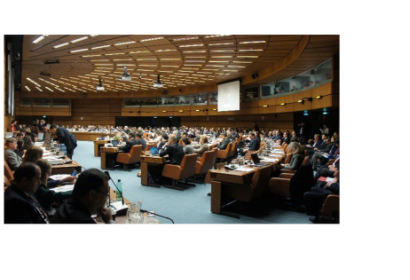Our planet is in peril. Communities around the world are feeling the impacts of climate change manifested in a variety of ways; our atmosphere, polar caps, and oceans are warming; and our frameworks of development are unfortunately having a severe impact on species and on the environment around the world. To address these challenges, in the year 2015, 193 countries launched the 2030 Agenda for Sustainable Development. But recent challenges like the COVID-19 pandemic, political turmoil in several countries, increasing poverty, and the slow pace in transforming to a greener economy are exacerbating the conditions of the people and the planet.
Recognizing the benefits of space technologies for the benefit of humankind, during its seventy-sixth session in October 2021, the United Nations General Assembly adopted the Space2030” Agenda: space as a driver of sustainable development. The adoption of this agenda, elevated by the Committee on the Peaceful Uses of Outer Space earlier this year, represents a milestone in the topic of international cooperation at “a time when new technologies have emerged and when an increasing number of participants, representing both governmental agencies and non-governmental entities, including industry and the private sector, are becoming involved in ventures to explore and use space and carry out space activities”.
The UN General Assembly noted that “space tools are highly relevant for the attainment of the global development agendas, in particular the 2030 Agenda for Sustainable Development and its goals and targets, either directly, as enablers and drivers of sustainable development, or indirectly, by providing essential data for the indicators used to monitor the progress towards achieving the 2030 Agenda and the Sendai Framework for Disaster Risk Reduction 2015–2030 and the commitments by States parties to the Paris Agreement.”
The Space2030 Agenda includes four overarching objectives:
- Enhance space-derived economic benefits and strengthen the role of the space sector as a major driver of sustainable development;
- Harness the potential of space to solve everyday challenges and leverage space-related innovation to improve the quality of life;
- Improve access to space for all and ensure that all countries can benefit socioeconomically from space science and technology applications and space-based data, information and products, thereby supporting the achievement of the Sustainable Development Goals; and
- Build partnerships and strengthen international cooperation in the peaceful uses of outer space and in the global governance of outer space activities.
For its implementation, the Space2030 Agenda calls on Member States contribute via partnerships, tools and resources. Among the tools included, the UN General Assembly mentioned UN-SPIDER. More information on the Space2030 Agenda is found here.
| Attachment | Size |
|---|---|
| Text of Space2030 Agenda (254.14 KB) | 254.14 KB |

